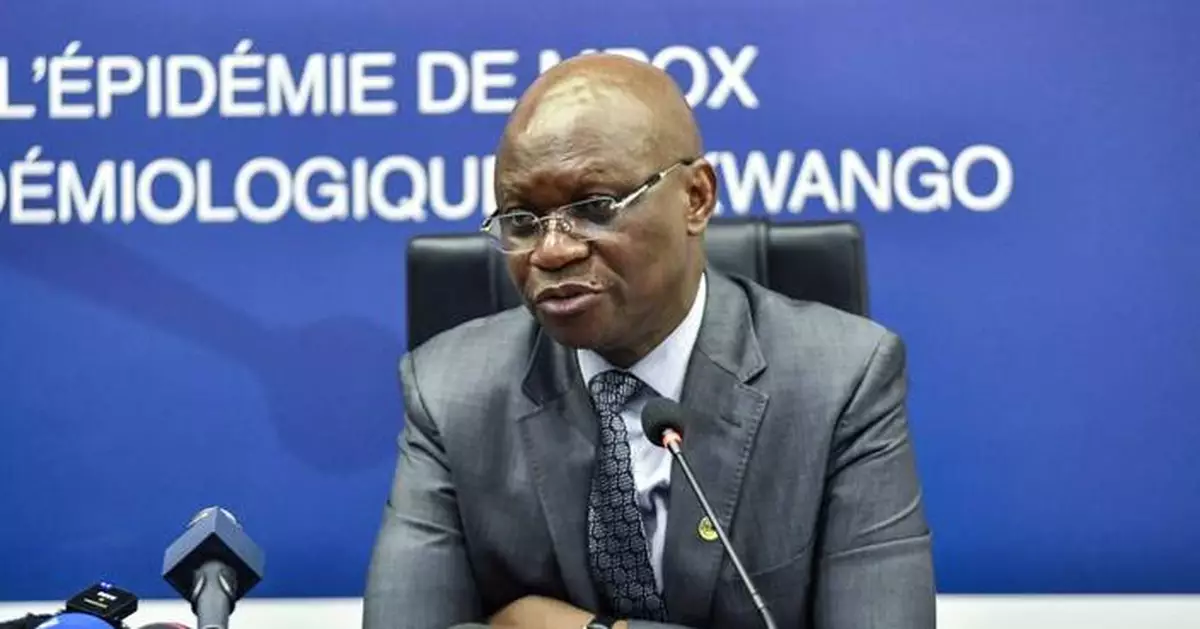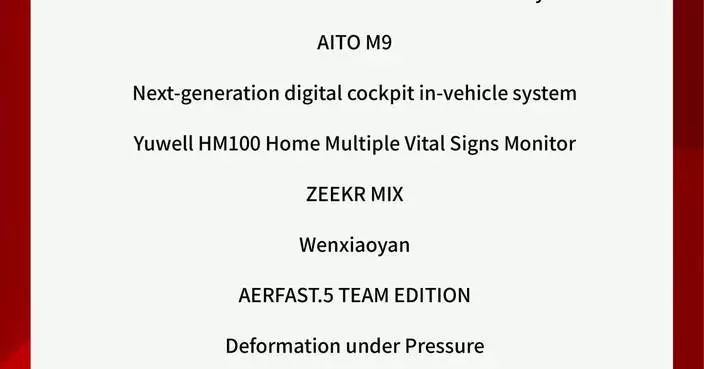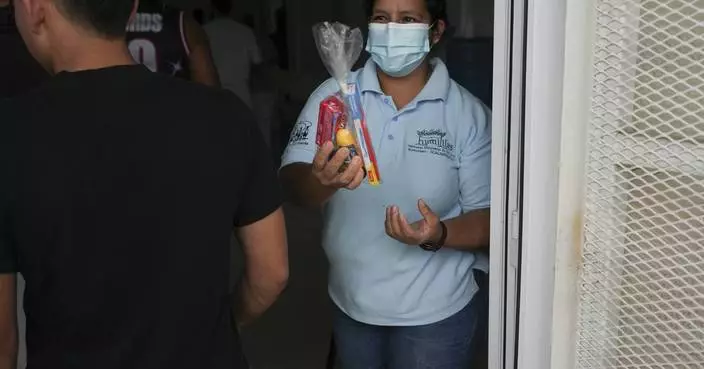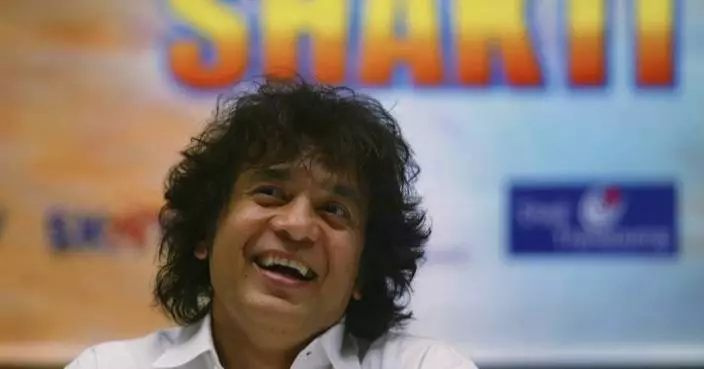KINSHASA, Congo (AP) — Public health officials in Africa urged caution Thursday as Congo’s health minister said the government was on alert over a mystery flu-like disease that in recent weeks killed dozens of people.
Jean Kaseya, the head of Africa Centers for Disease Control and Prevention, told reporters that more details about the disease should be known in the next 48 hours as experts receive results from laboratory samples of infected people.
Click to Gallery
A view of the general Hospital Panzi in southwestern Congo, Thursday, Nov 5, 2024. (AP Photo/Lucien Lufutu)
A view of the general Hospital Panzi in southwestern Congo, Thursday, Nov 5, 2024. (AP Photo/Lucien Lufutu)
A view of the general Hospital Panzi in southwestern Congo, Thursday, Nov 5, 2024. (AP Photo/Lucien Lufutu)
Congo's Health Minister Roger Kamba speaks, during a press conference, in Congo, Kinshasa, Thursday, Nov 5, 2024. (AP Photo/Samy Ntumba Shambuyi)
Congo's health minister Roger Kamba attends a press conference in Kinshasa, Congo, Thursday, Dec. 5, 2024. (AP Photo/Samy Ntumba Shambuyi)
Congo's Health Minister Roger Kamba speaks, during a press conference, in Congo, Kinshasa, Thursday, Nov 5, 2024. (AP Photo/Samy Ntumba Shambuyi)
“First diagnostics are leading us to think it is a respiratory disease,” Kaseya said. “But we need to wait for the laboratory results.” He added that there are many things that are still unknown about the disease — including whether it is infectious and how it is transmitted.
Authorities in Congo have so far confirmed 71 deaths, including 27 people who died in hospitals and 44 in the community in the southern Kwango province, health minister Roger Kamba said.
“The Congolese government is on general alert regarding this disease," Kamba said, without providing more details.
Of the victims at the hospitals, 10 died due to lack of blood transfusion and 17 as a result of respiratory problems, he said.
The deaths were recorded between Nov. 10 and Nov. 25 in the Panzi health zone of Kwango province. There were around 380 cases, almost half of which were children under the age of five, according to the minister.
The Africa CDC recorded slightly different numbers, with 376 cases and 79 deaths. The discrepancy was caused by problems with surveillance and case definition, Kaseya said.
Authorities have said that symptoms include fever, headache, cough and anemia. Epidemiological experts are in the region to take samples and investigate the disease, the minister said.
The Panzi health zone, located around 435 miles (700 kilometers) from the capital Kinshasa, is a remote area of the Kwango province, making it hard to access.
The epidemiological experts took two days to arrive there, the minister said. Because of the lack of testing capacity, samples had to be taken to Kikwit, more than 500 km away, said Dieudonne Mwamba, the head of the National Institute for Public Health.
“The health system is quite weak in our rural areas, but for certain types of care, the ministry has all the provisions, and we are waiting for the first results of the sample analysis to properly calibrate things,” Kaseya said.
Mwamba said that Panzi was already a “fragile” zone, with 40% of its residents experiencing malnutrition. It was also hit by an epidemic of typhoid fever two years ago, and there is currently a resurgence of seasonal flu across the country.
“We need to take into account all this as context," Mwamba said.
A Panzi resident, Claude Niongo, said his wife and seven-year-old daughter died from the disease.
“We do not know the cause but I only noticed high fevers, vomiting... and then death,” Niongo told The Associated Press over the phone. "Now, the authorities are talking to us about an epidemic but in the meantime, there is a problem of care (and) people are dying,” he added.
Lucien Lufutu, president of the civil society consultation framework of Kwango province, who is in Panzi, said the local hospital where patients are treated is underequipped.
“There is a lack of medicines and medical supplies, since the disease is not yet known, most of the population is treated by traditional practitioners,” Lufutu told the AP.
He also said the disease affected Katenda, another nearby health zone.
When asked about a potential outbreak in other health zones, the minister said he could not tell if that was the case but that nothing was reported.
Congo is already plagued by the mpox epidemic, with more than 47,000 suspected cases and over 1,000 suspected deaths from the disease in the Central African country, according to the World Health Organization.
——-
The Associated Press receives financial support for global health and development coverage in Africa from the Gates Foundation. The AP is solely responsible for all content. Find AP’s standards for working with philanthropies, a list of supporters and funded coverage areas at AP.org.
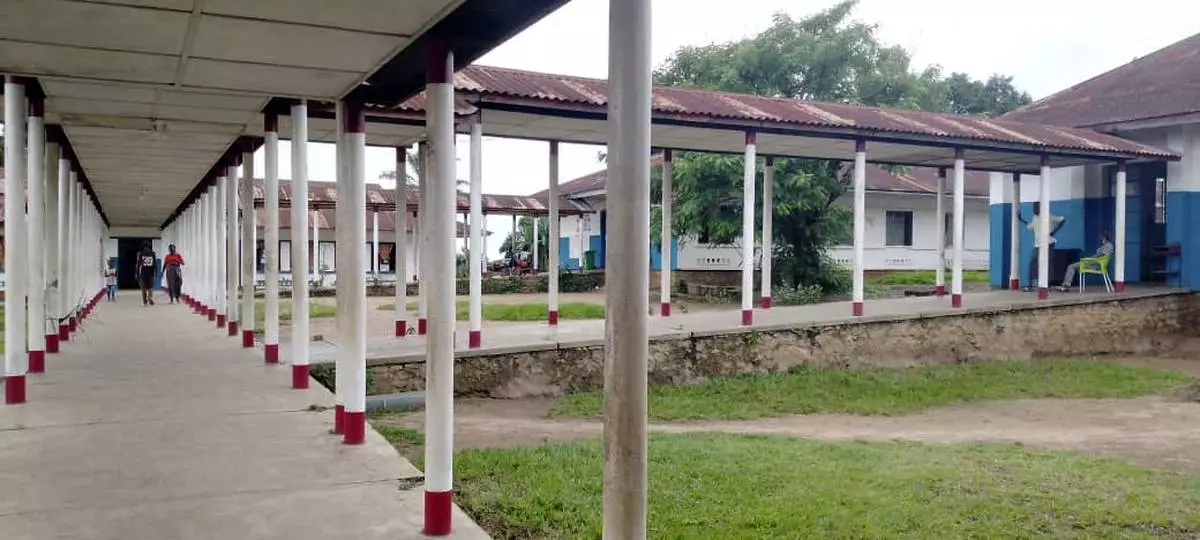
A view of the general Hospital Panzi in southwestern Congo, Thursday, Nov 5, 2024. (AP Photo/Lucien Lufutu)
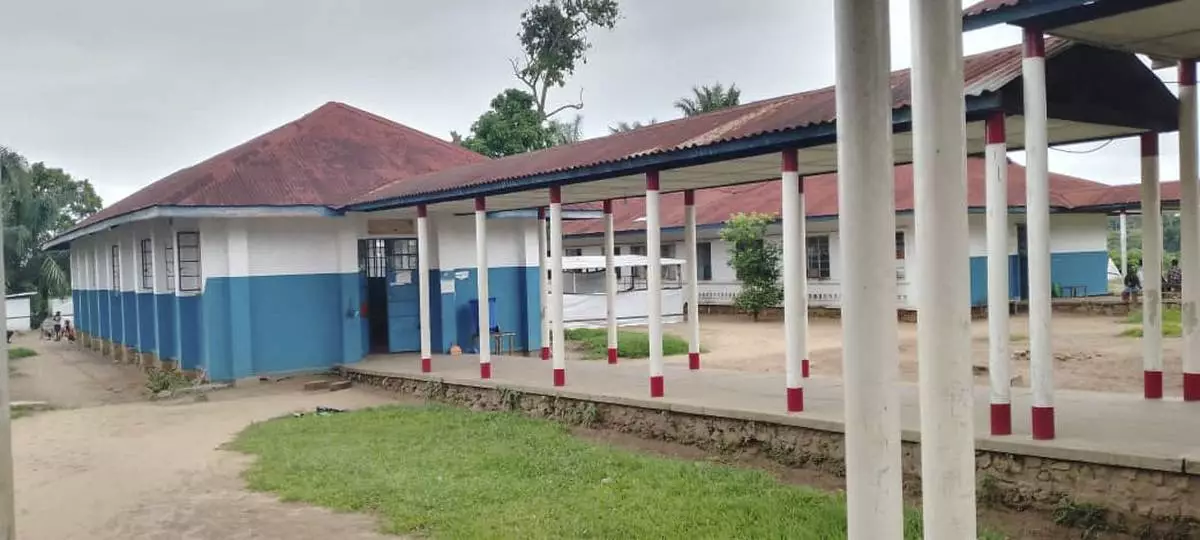
A view of the general Hospital Panzi in southwestern Congo, Thursday, Nov 5, 2024. (AP Photo/Lucien Lufutu)
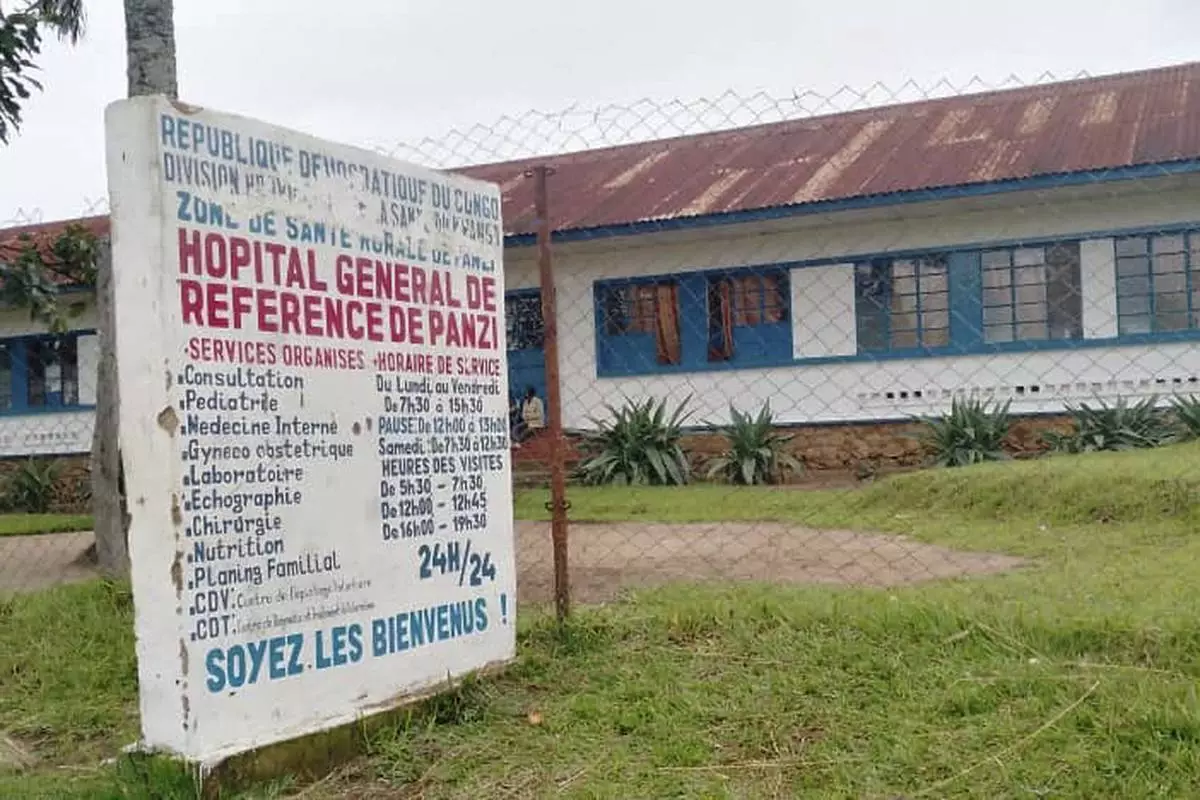
A view of the general Hospital Panzi in southwestern Congo, Thursday, Nov 5, 2024. (AP Photo/Lucien Lufutu)
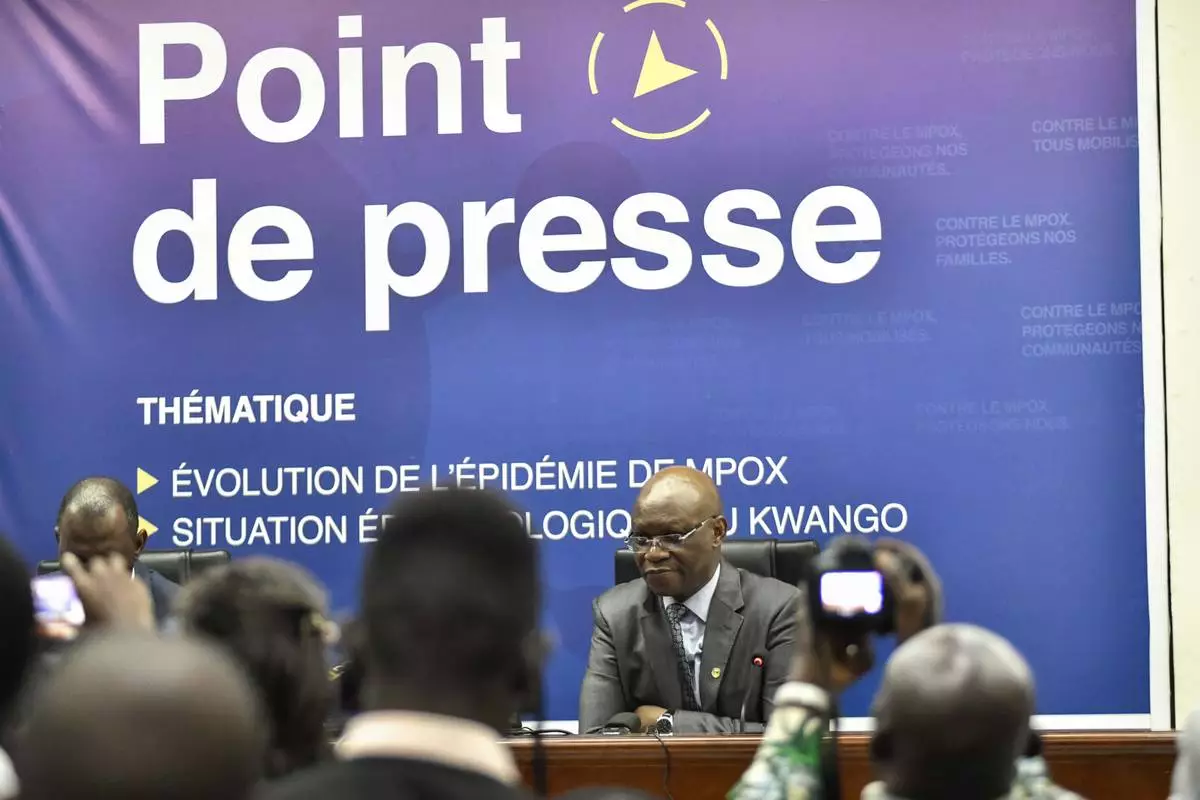
Congo's Health Minister Roger Kamba speaks, during a press conference, in Congo, Kinshasa, Thursday, Nov 5, 2024. (AP Photo/Samy Ntumba Shambuyi)
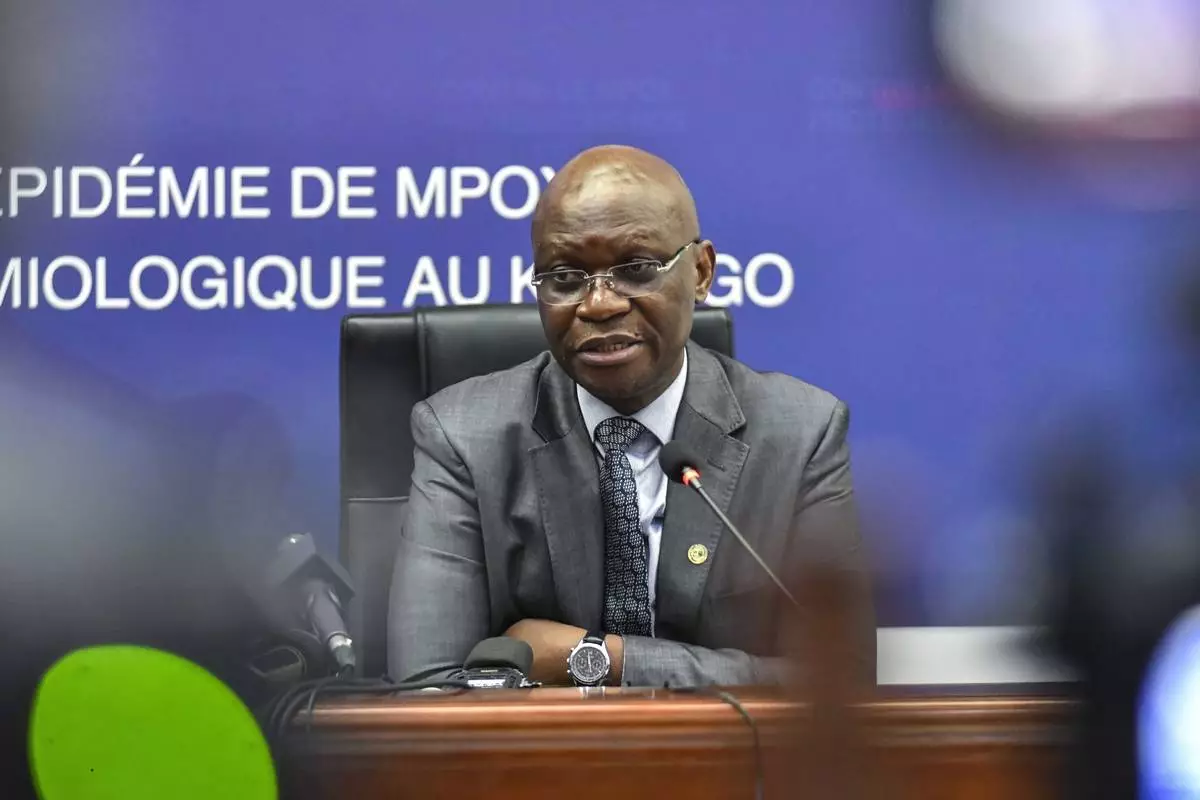
Congo's health minister Roger Kamba attends a press conference in Kinshasa, Congo, Thursday, Dec. 5, 2024. (AP Photo/Samy Ntumba Shambuyi)
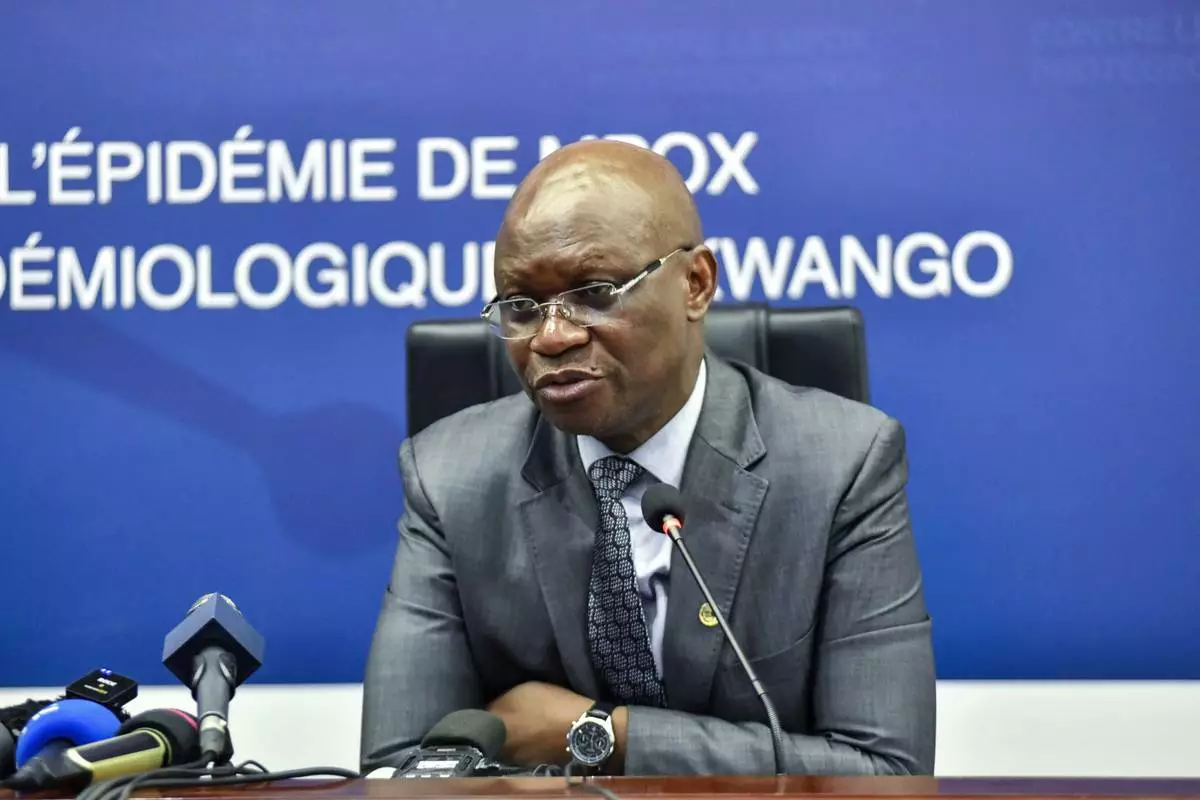
Congo's Health Minister Roger Kamba speaks, during a press conference, in Congo, Kinshasa, Thursday, Nov 5, 2024. (AP Photo/Samy Ntumba Shambuyi)
SEOUL, South Korea (AP) — South Korean law enforcement authorities are pushing to summon impeached President Yoon Suk Yeol for questioning over his short-lived martial law decree as the Constitutional Court began its first meeting Monday on Yoon’s case to determine whether to remove him from office or reinstate him.
A joint investigative team involving police, an anti-corruption agency and the Defense Ministry said it wants to question Yoon on charges of rebellion and abuse of power in connection with his ill-conceived power grab.
The team on Monday morning tried to convey a request to Yoon’s office that he appear for questioning on Wednesday but was rerouted to Yoon’s personal residence, Son Yeong-jo, an investigator with the Corruption Investigation Office for High-Ranking Officials, told reporters.
Son cited presidential secretarial staff as claiming they were unsure whether conveying the request to the impeached president was part of their duties. He declined to provide specifics when asked how investigators would respond if Yoon refuses to appear.
Yoon was impeached by the opposition-controlled National Assembly on Saturday over his Dec. 3 martial law decree. His presidential powers have been subsequently suspended, and the Constitutional Court is to determine whether to formally remove him from office or reinstate him. If Yoon is dismissed, a national election to choose his successor must be held within 60 days.
Yoon has justified his martial law enforcement as a necessary act of governance against the main liberal opposition Democratic Party that he described as “anti-state forces” bogging down his agendas and vowed to “fight to the end” against efforts to remove him from office.
Hundreds of thousands of protesters have poured onto the streets of the country’s capital, Seoul, in recent days, calling for Yoon’s ouster and arrest.
It remains unclear whether Yoon will grant the request by investigators for an interview. South Korean prosecutors, who are pushing a separate investigation into the incident, also reportedly asked Yoon to appear at a prosecution office for questioning on Sunday but he refused to do so. Repeated calls to a prosecutors’ office in Seoul were unanswered.
Yoon’s presidential security service has also resisted a police attempt to search Yoon's office for evidence.
Also Monday, the Constitutional Court met for the first time to discuss the case. The court has up to 180 days to rule. But observers say a ruling could come faster.
In the case of parliamentary impeachments of past presidents — Roh Moo-hyun in 2004 and Park Geun-hye in 2016 — the court spent 63 days and 91 days respectively before determining to reinstate Roh and dismiss Park.
Kim Hyungdu, a court justice, told reporters earlier Monday that the court will “swiftly and fairly” make a decision in the case. He said Monday’s court meeting was meant to discuss preparatory procedures and how to arrange arguments at formal trials.
Upholding Yoon’s impeachments needs support from at least six out of the court’s nine justices, but three seats are vacant now. This means a unanimous ruling by the court’s current six justices in favor of Yoon's impeachment is required to formally end his presidency. Kim said he expected the three vacant seats to be filled by the end of this month.
Prime Minister Han Duck-soo, who became the country’s acting leader after Yoon's impeachment, and other government officials have sought to reassure allies and markets after Yoon’s surprise stunt paralyzed politics, halted high-level diplomacy and complicated efforts to revive a faltering economy.
Democratic Party leader Lee Jae-myung urged the Constitutional Court to rule swiftly on Yoon’s impeachment and proposed a special council for policy cooperation between the government and parliament. Yoon’s conservative People Power Party criticized Lee’s proposal for the special council, saying that it’s “not right” for the opposition party to act like the ruling party.
Lee, a firebrand lawmaker who drove a political offensive against Yoon’s government, is seen as the frontrunner to replace him. He lost the 2022 presidential election to Yoon by a razor-thin margin.
Yoon’s impeachment, which was endorsed in parliament by some of his ruling party lawmakers, has created a deep rift within the party between Yoon’s loyalists and his opponents. On Monday, PPP chair Han Dong-hun, a strong critic of Yoon's martial law, announced his resignation.
“If martial law had not been lifted that night, a bloody incident could have erupted that morning between the citizens who would have taken to the streets and our young soldiers,” Han told a news conference.
Yoon’s Dec. 3 imposition of martial law, the first of its kind in more than four decades, harkened back to an era of authoritarian leaders the country has not seen since the 1980s. Yoon was forced to lift his decree hours later after parliament unanimously voted to overturn it.
Yoon sent hundreds of troops and police officers to the parliament in an effort to stop the vote, but they withdrew after the parliament rejected Yoon’s decree. No major violence occurred.
Opposition parties have accused Yoon of rebellion, saying a president in South Korea is allowed to declare martial law only during wartime or similar emergencies and would have no right to suspend parliament’s operations even in those cases.
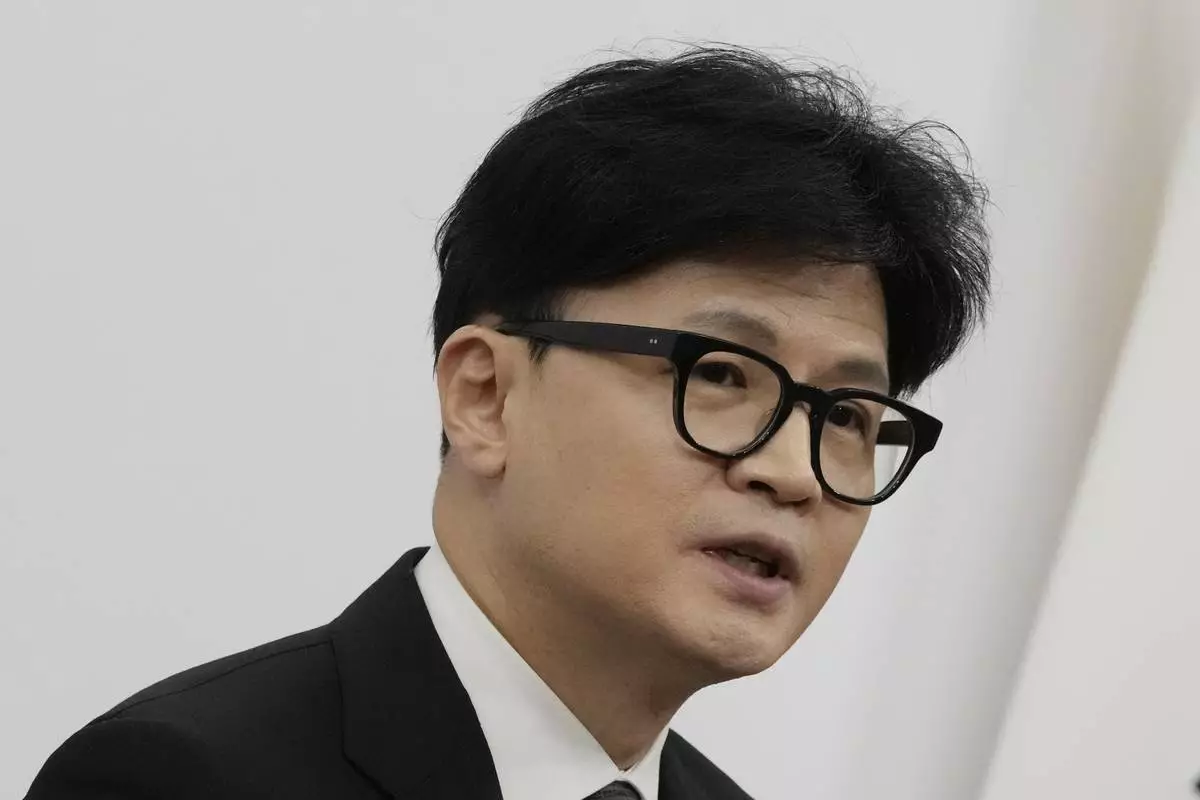
South Korea's ruling People Power Party leader Han Dong-hun speaks during a news conference to announce his resignation after President Yoon Suk Yeol's parliamentary impeachment, at the National Assembly in Seoul, South Korea, Monday, Dec. 16, 2024. (AP Photo/Ahn Young-joon)
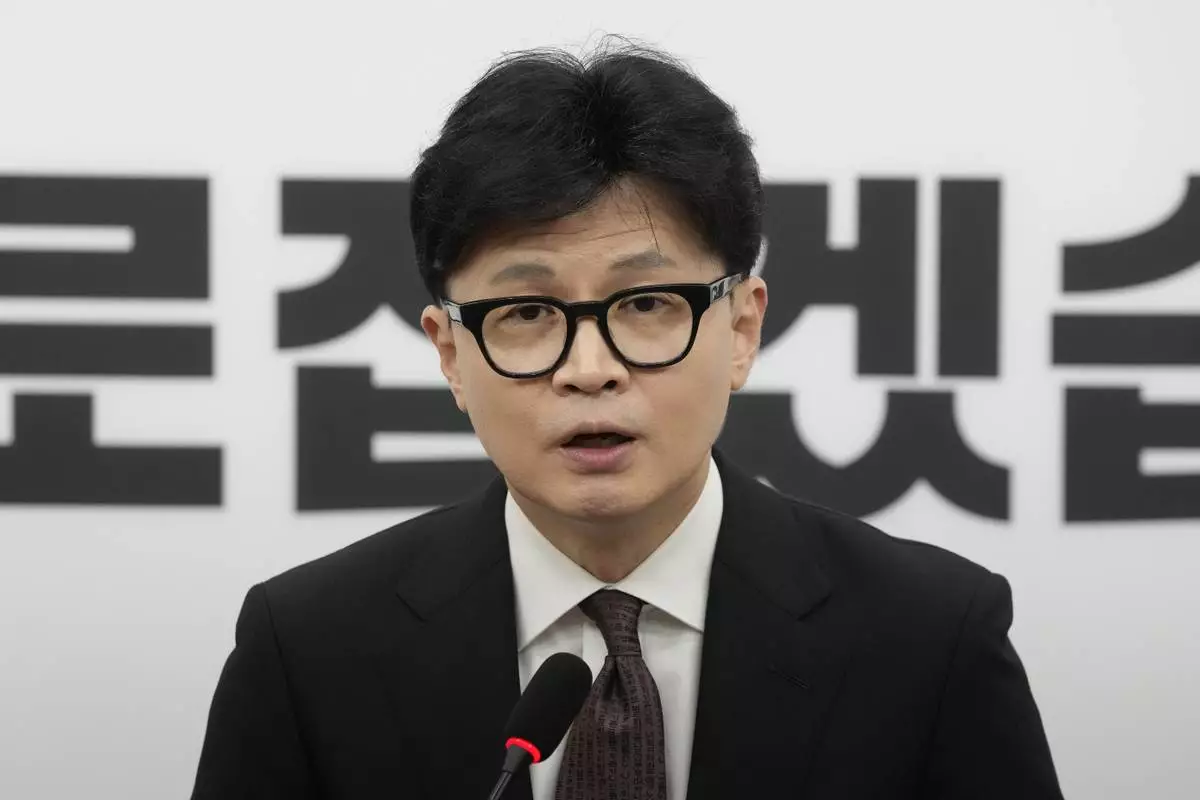
South Korea's ruling People Power Party leader Han Dong-hun speaks during a news conference to announce his resignation after President Yoon Suk Yeol's parliamentary impeachment, at the National Assembly in Seoul, South Korea, Monday, Dec. 16, 2024. (AP Photo/Ahn Young-joon)
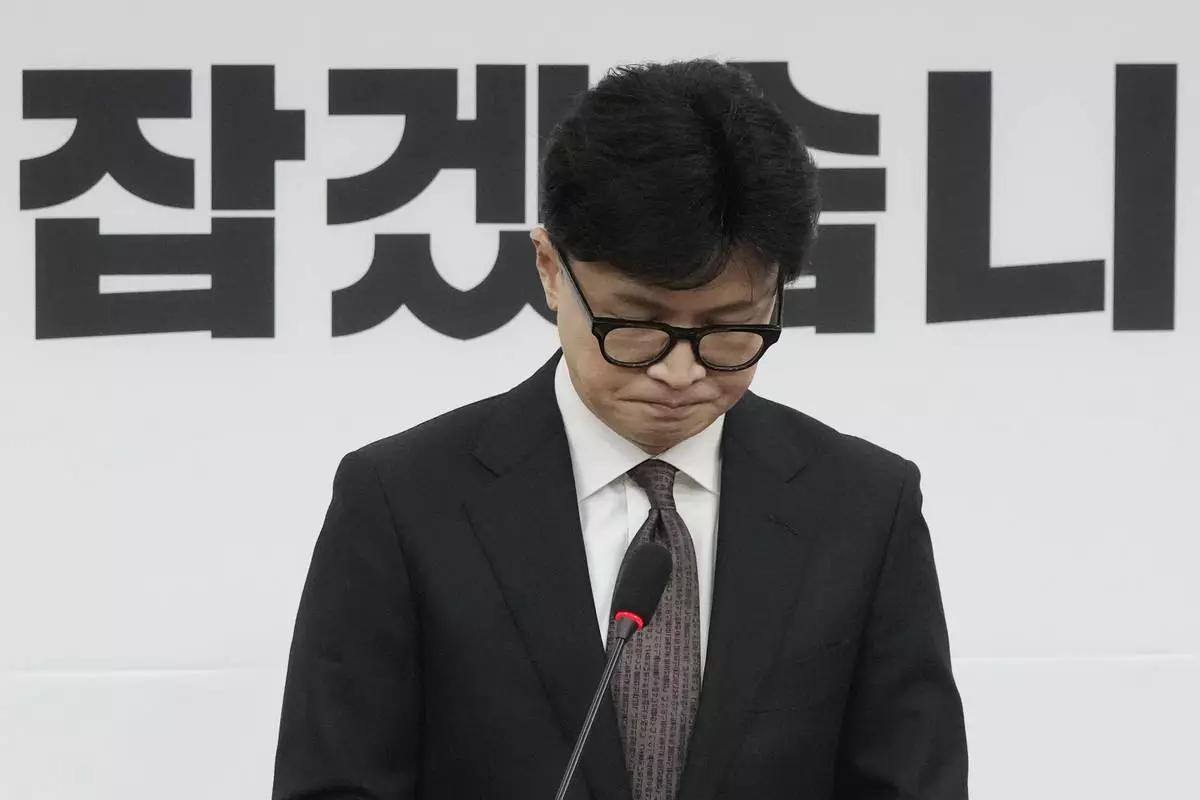
South Korea's ruling People Power Party leader Han Dong-hun reacts during a news conference to announce his resignation after President Yoon Suk Yeol's parliamentary impeachment, at the National Assembly in Seoul, South Korea, Monday, Dec. 16, 2024. (AP Photo/Ahn Young-joon)
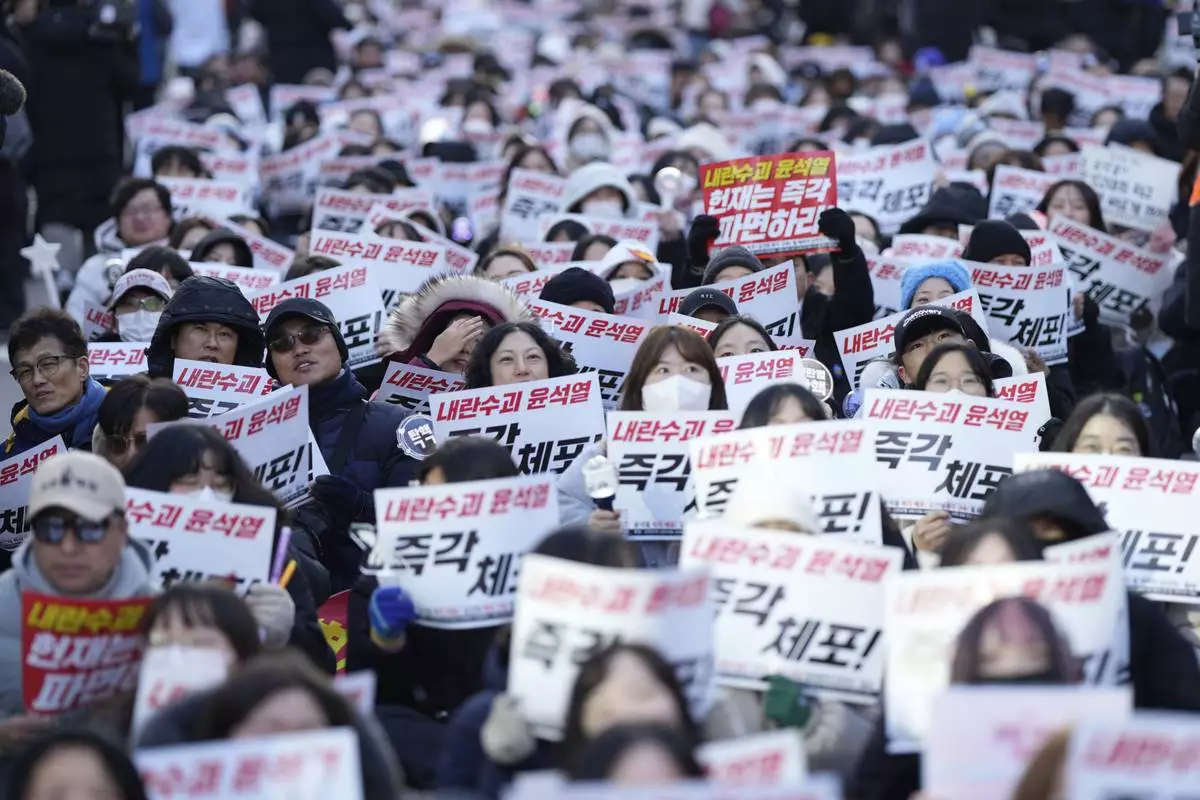
Participants shout slogans during a rally calling on the Constitutional Court to dismiss the President Yoon Suk Yeol in Seoul, South Korea, Sunday, Dec. 15, 2024. The signs read "Immediately arrest." (AP Photo/Lee Jin-man)
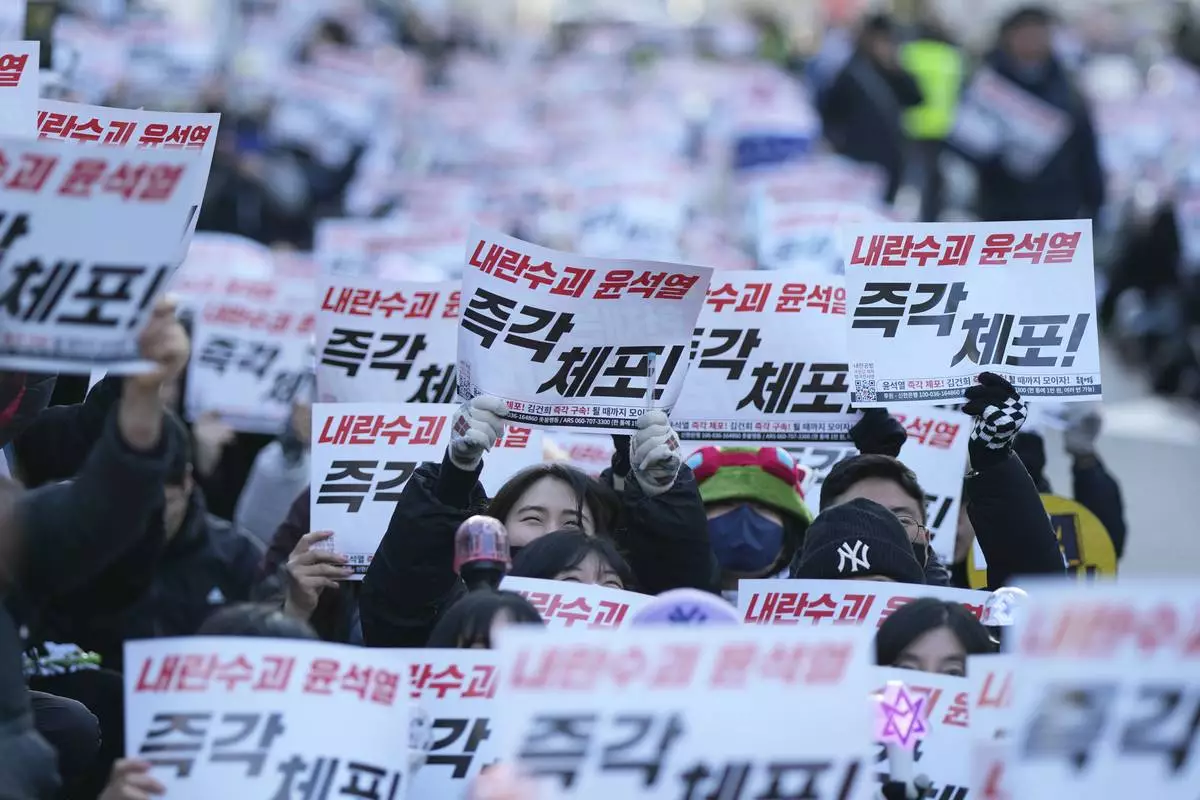
Participants shout slogans during a rally calling on the Constitutional Court to dismiss the President Yoon Suk Yeol, in Seoul, South Korea, Sunday, Dec. 15, 2024. The signs read "Immediately arrest." (AP Photo/Lee Jin-man)
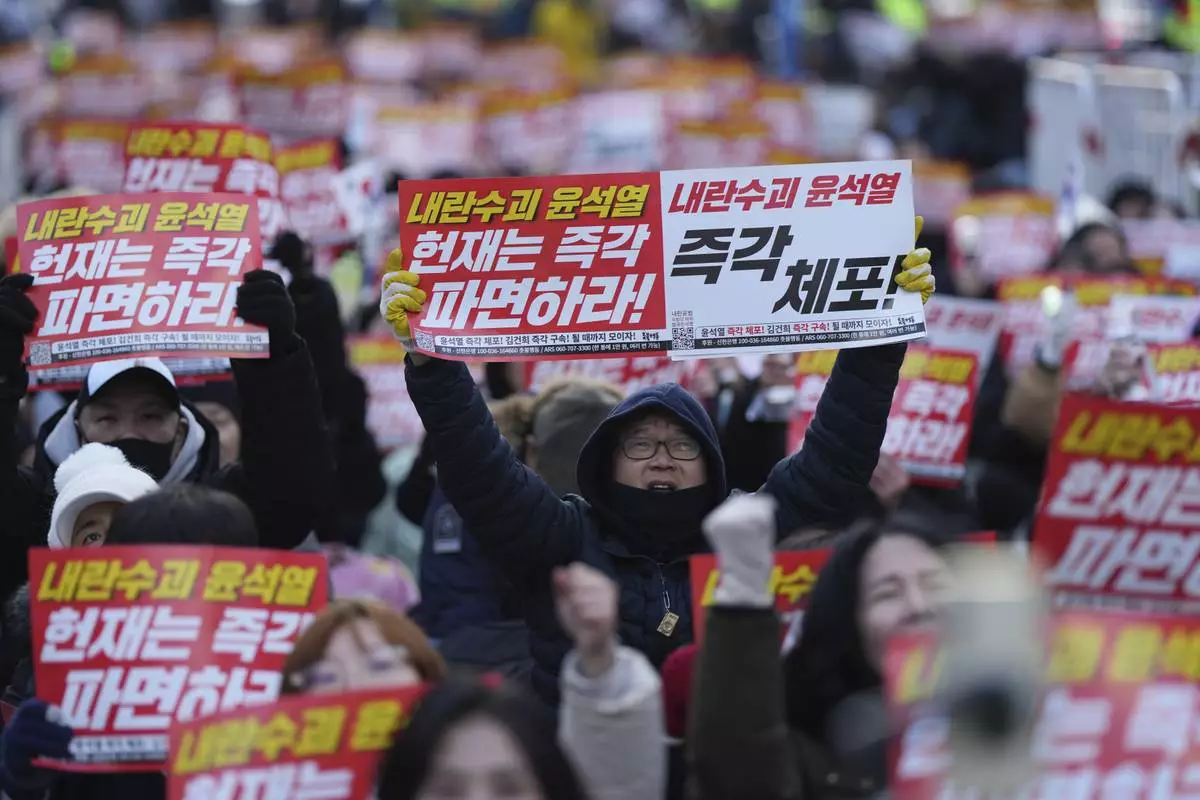
Participants shout slogans during a rally calling on the Constitutional Court to dismiss the President Yoon Suk Yeol, in Seoul, South Korea, Sunday, Dec. 15, 2024. The signs read "Immediately arrest." (AP Photo/Lee Jin-man)
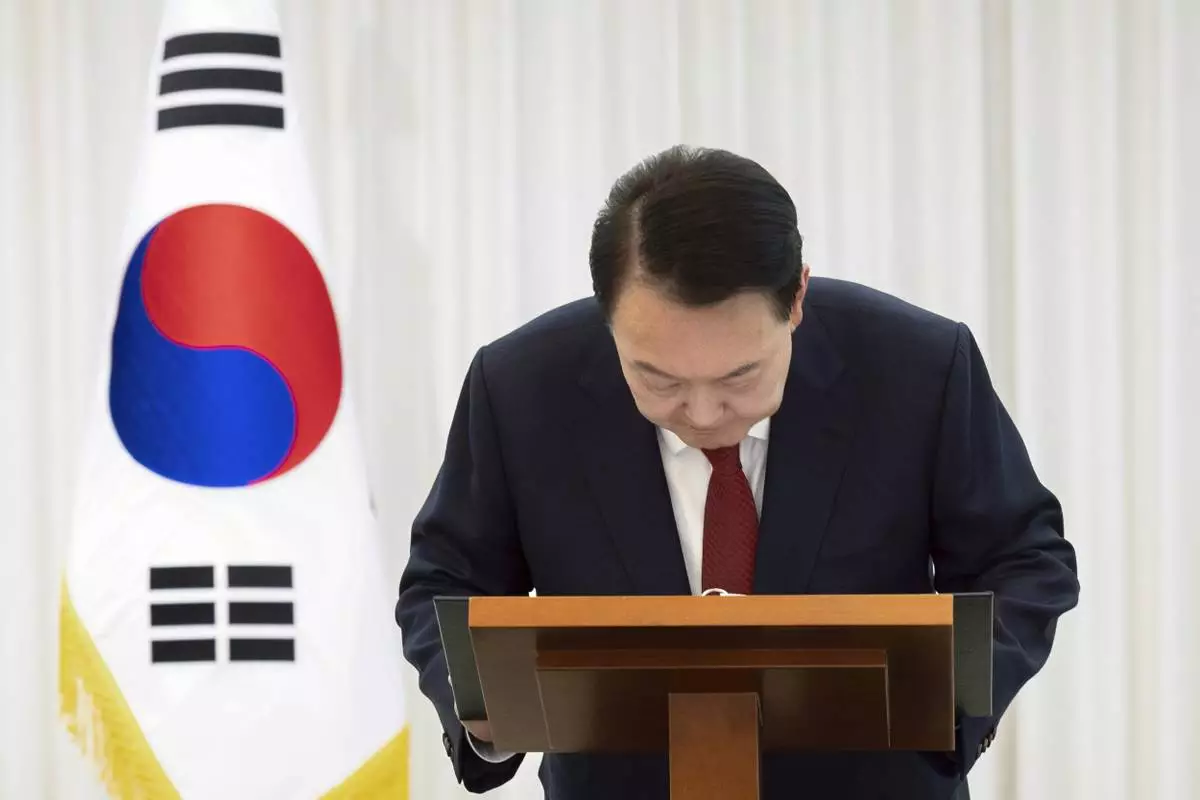
In this photo released by South Korean President Office via Yonhap, South Korean President Yoon Suk Yeol bows while delivering a speech at the presidential residence in Seoul, South Korea, after South Korea’s parliament voted to impeach Yoon Saturday, Dec. 14, 2024. (South Korean Presidential Office/Yonhap via AP)
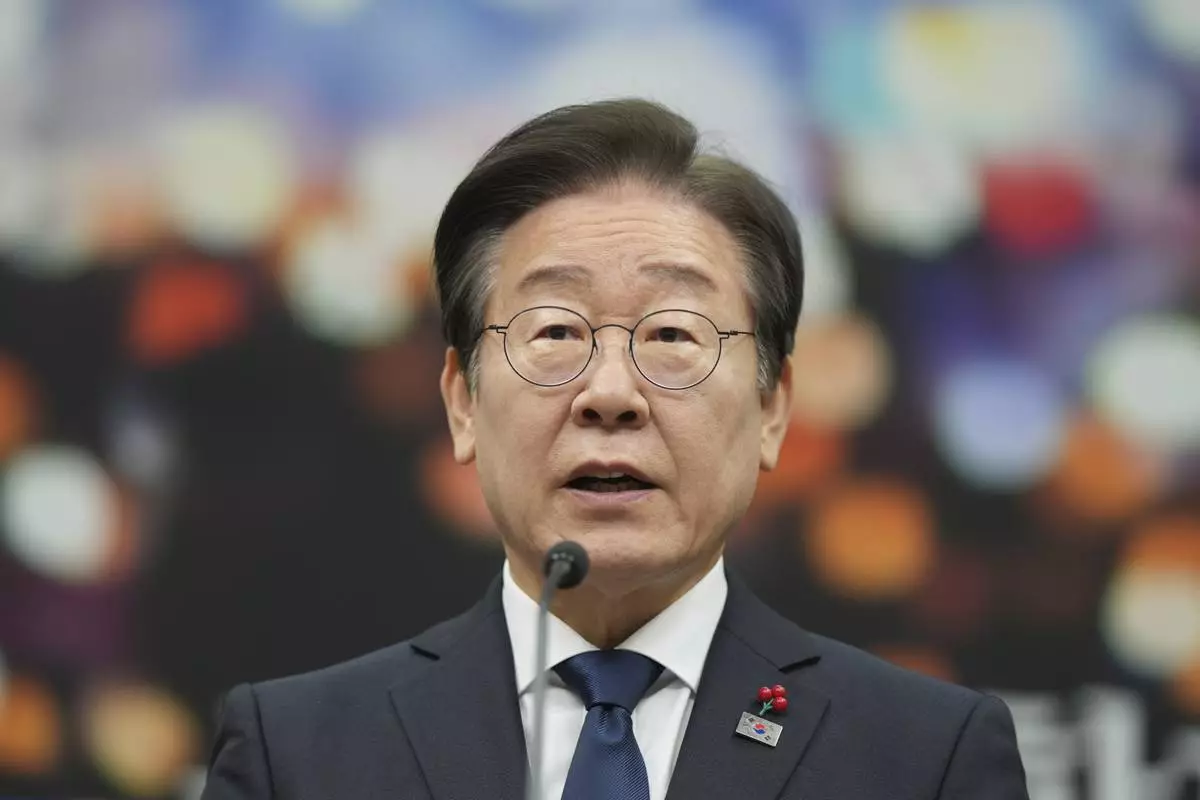
South Korea's main opposition Democratic Party leader Lee Jae-myung speaks during a press conference on removal of President Yoon Suk Yeol from office, at the party office at the National Assembly building in Seoul, South Korea, Sunday, Dec. 15, 2024. (AP Photo/Lee Jin-man)
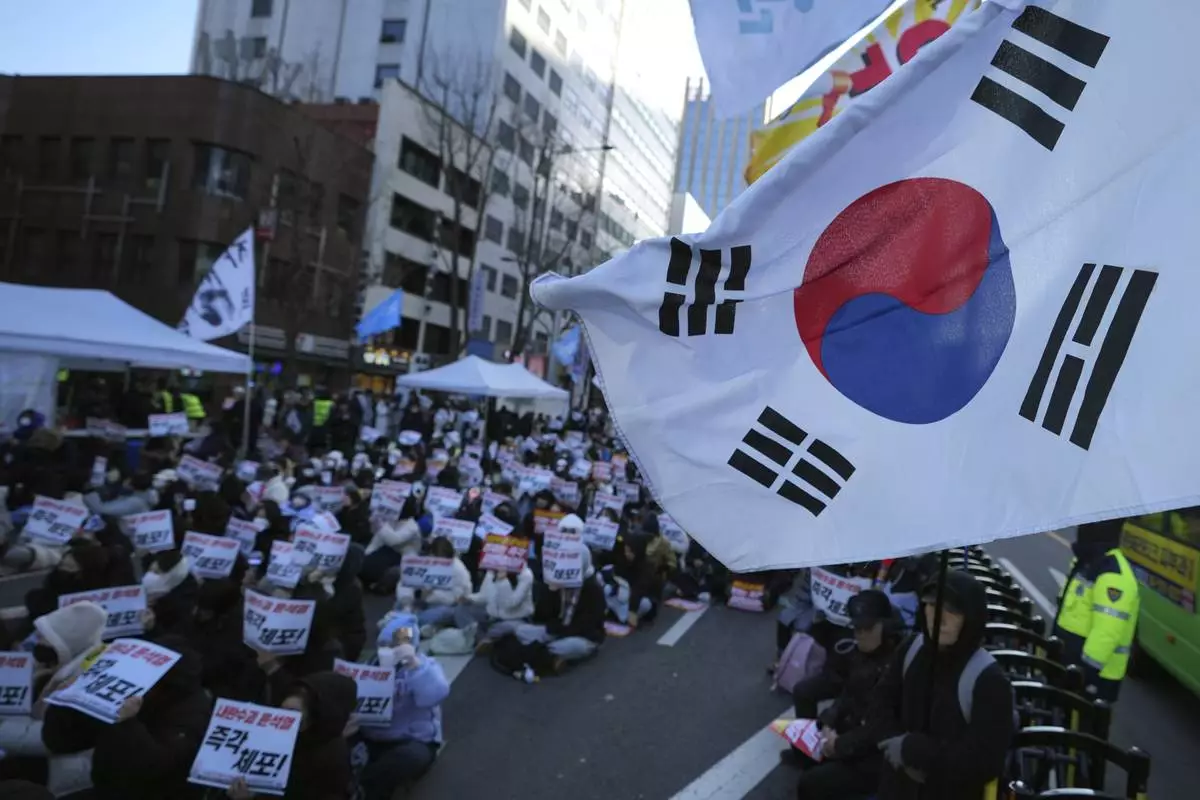
Participants hold signs during a rally calling on the Constitutional Court to dismiss the President Yoon Suk Yeol in Seoul, South Korea, Sunday, Dec. 15, 2024. The signs read "Immediately arrest." (AP Photo/Lee Jin-man)








